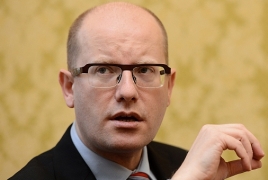
Czech Prime Minister Bohuslav Sobotka rejected on Friday, November 25Turkey's "attempt at political blackmail" by threatening to provoke another migrant wave, and said that both Turkey and the EU must do their utmost to observe their migration agreement signed in the spring, the Prague Daily Monitor says.
In a press release, Sobotka (Social Democrats, CSSD) reacted to Turkish President Recep Tayyip Erdogan, who threatened earlier on Friday with Turkey opening its borders to the refugees who want to leave for Europe.
At a separate conference, Czech President Milos Zeman labelled Ankara's approach blackmail and called for the fortification of EU borders.
Erdogan, for his part, was reacting to the European Parliament's proposal on Thursday that the EU freeze the Turkish accession negotiations due to Ankara's approach against alleged participants in the unsuccessful coup from July.
The EP's proposal, which is not binding on the EU, preserves a chance to resume the process of Turkey's accession. Sobotka said both parties must do their utmost for the spring deal to be observed.
"The Czech government supported the agreement because it is one of key instruments to cope with the migrant crisis, one based on the principles of border protection and stemming illegal migration, both of which are our long-term priorities," Sobotka said.
Zeman, on a visit to north Bohemia, said he has criticised the EU-Turkey migrant readmission deal for a long time. "I think Europe should not let itself blackmailed. Second, it should react to this threat by a consistent fortification of its external borders, something it should have done long ago," Zeman said.
Foreign Minister Lubomir Zaoralek (CSSD) commented on the issue on Twitter.
"The EU-Turkey agreement is based on clearly defined obligations the two sides must meet. Europe does meet its part of the deal. Its fulfilment should not be affected by strong political statements," Zaoralek tweeted.
The EU-Turkish agreement has markedly stemmed the influx of refugees from Turkey to Greece. In exchange, the EU promised financial aid to Turkey as well as progress in Ankara's accession talks and a softening of visa relations.
Turkey, however, has accused Europe of failing to fulfil the deal and it is threatening to abrogate it.
Like Zaoralek, Sobotka said the agreement is based on clearly defined duties which both parties have to fulfil.
Europe does so, which is why the current threats by Turkey are unsubstantiated. "The scaring with a migration wave must not become subject to political bargaining," Sobotka said.
The crucial thing is the continuation of the dialogue, in which the EU should emphasise its interest in democratic Turkey, Sobotka said.
Besides, Europe must also carry on its projects aimed to reinforce its external borders, he said.
In the same intensive way, the EU must be pushing for the striking of a peace agreement in Syria, which would enable refugees' return to the country, Sobotka added.

